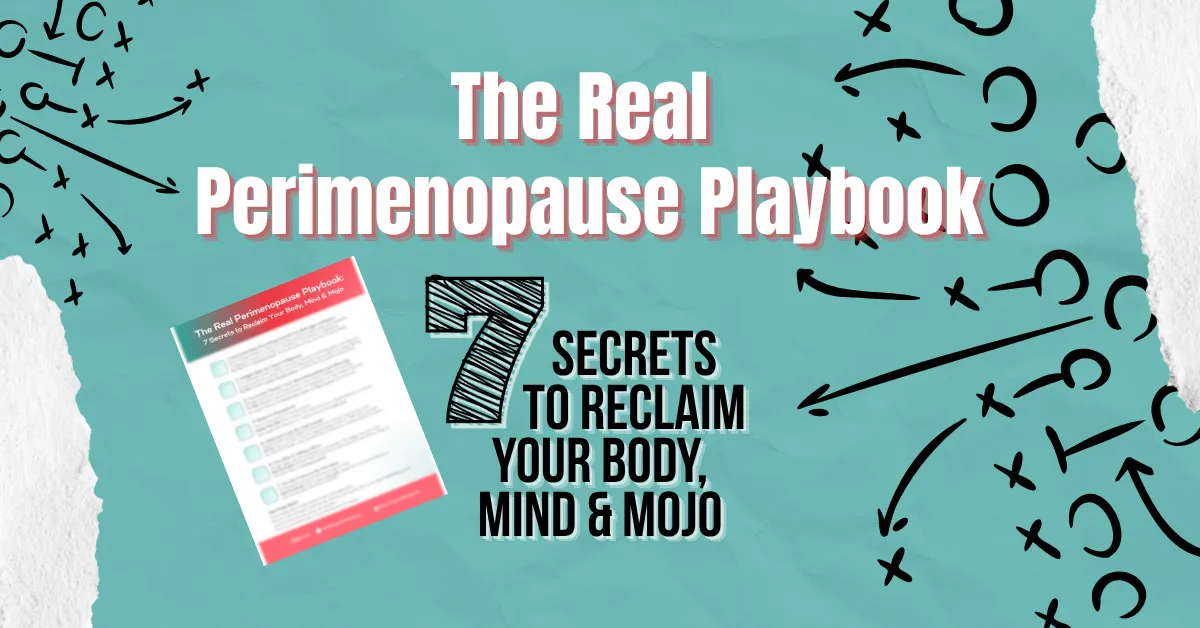
The Real Perimenopause Playbook: 7 Secrets to Reclaim Your Body, Mind & Mojo
Let’s not sugarcoat it—perimenopause can feel like your body is glitching and your brain forgot the WiFi password. Have you ever wondered just why everything feels “off” in midlife—your mood, your sleep, even your waistline? The answer isn’t that you’re broken or lazy or dying of a disease they haven't diagnosed yet. It’s your hormones. Estrogen, progesterone, and other key hormones are shifting, and those changes impact everything from energy to emotions.
Perimenopause isn’t something to fear—it’s something to understand. When you learn how your body works, you can stop blaming yourself and start supporting yourself.
This blog post will give you the tools to recognize what’s really happening in your body, why hormones play such a big role, and simple steps you can take today to feel more balanced, energized, and in control. By the end, you’ll see that perimenopause isn’t the end of your story—it’s the start of a new chapter.

Hormones Rule Everything Around You
Hormones are chemical messengers that affect every part of your body. Estrogen in particular is like the queen bee—she influences your brain, your bones, your heart, your skin, and even your mood.
When estrogen starts to fluctuate in perimenopause, it can feel like your whole world is out of sync. One day you feel fine, the next you’re crying in the pantry or staring at the ceiling at 2 a.m. This isn’t weakness. It’s biology.
Common Signs of Perimenopause
Hot flashes and night sweats: sudden waves of heat that soak your clothes and disrupt sleep.
Mood swings: irritability, anxiety, or sadness that feels out of the blue; trouble regulating your reactions to things big and small. (Have you been getting tearful at puppy commercials or outraged at people breathing too loud?)
Brain fog: forgetting why you walked into a room or losing your train of thought mid-sentence.
Sleep troubles: falling asleep or staying asleep becomes harder.
Changes in cycle: periods may be heavier, lighter, closer together, or farther apart.
Anxiety and intrusive thoughts: things that used to be no big deal now feel like the end of the world and your brain starts cooking up scenarios that put best-selling horror authors to shame.
These symptoms aren’t “all in your head.” They’re real, and they happen because hormones are shifting.
Why Understanding Matters
Too many women are told “it’s just stress” or “this is normal aging.” But you deserve better than being dismissed like that. Knowing what’s happening in your body helps you advocate for yourself, make informed choices, and take back your confidence.
When you understand hormones, you stop fighting your body and start partnering with it.
Simple Steps for Support
You don’t have to overhaul your whole life to feel better. Small, consistent shifts make a huge difference.
Movement: Walking, light strength training, and stretching support energy and bone health.
Nutrition: Anti-inflammatory foods like leafy greens, berries, and salmon help balance your system.
Sleep hygiene: Dark, cool rooms and no electronic screens before bed will improve rest.
Stress relief: Breathing exercises, meditation, or simply saying “no” more often protects your nervous system and prevents burnout.
Advocacy: Keep track of symptoms and bring them to your healthcare provider. Ask questions until you feel heard. If your provider isn't up to date with the latest best practices for treating menopausal women, keep looking until you find one who is! The menopause society has a website that lists providers who know how to treat women in menopause!
The Bigger Picture
Perimenopause is not the end—it’s a transition. By learning to work with your hormones instead of against them, you can restore energy, rebuild confidence, and step into your next chapter with strength.

Perimenopause may feel overwhelming, but it doesn’t have to define you. Hormones rule so much of our lives, but when you understand how they work, you reclaim the power to care for yourself with wisdom instead of fear.
From mood swings to brain fog, from hot flashes to sleepless nights—these are signals from your body, not signs that you’re broken. And with small steps like movement, nutrition, sleep, and stress support, you can feel more like yourself again.
Perimenopause isn’t the end of your glow. It’s the beginning of your next chapter—one where you’re informed, empowered, and unmuted.
✨ Want this information in a simple guide you can hold in your hands? Click here to download your own copy of the Perimenopause Playbook. It includes links to free resources and all my favorite products.
Share this post with a friend who’s one mood swing away from burning it all down. Shareable links at the top of the page! If you want to go deeper, book a free 30 minute clarity call to map out a personalized perimenopause gameplan.

